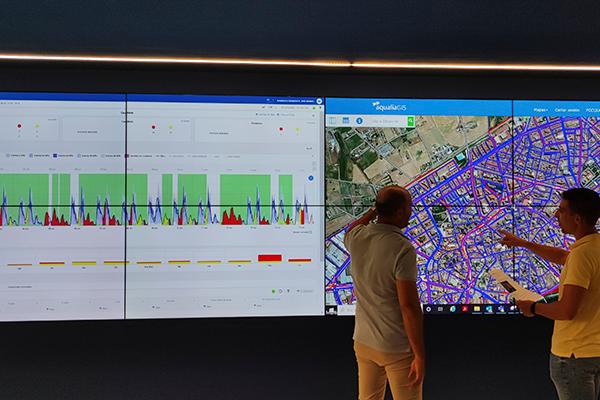
Water digitalisation and planning, challenges for the sector to foster a development cascade effect
-
On this World Water Day, the United Nations is calling for coordinated action to multiply the positive effects, promoting development and resilience in the face of common challenges
-
Aqualia draws attention to the importance of having sustained water planning and of advancing in the digitalisation process to achieve efficient and sustainable water management

On World Water Day, which is celebrated this Friday 22nd March, the United Nations underlines the value of water, not only as a usable resource, but also as an engine for development and well-being. Under the slogan "Water for peace", the organisation proposes coordinated action in this area to create a positive cascade effect, promoting development and resilience in the face of common challenges. In Spain, where almost the entire population has access to drinking water, the path is to promote end-to-end management of water resources and encourage advances in technology and digitalisation.
Seven of the ten most water-stressed basins in the European Union are in Spain, according to the European Environment Agency. Water stress has become a major issue, and to tackle it, the way forward is to improve efficiency and sustainability in water management. Efficiency implies sustained water planning and efficient infrastructure, incorporating new technologies and renewed from time to time. Investing in infrastructure ensures continuity of service, with lower operating and maintenance costs.
Digitalisation, a driving force for development and efficiency
The planning and strategy of the administrations must be accompanied by the efforts of the operators that manage the water service. Specialised companies can provide technology, innovation capacity and investment to offer specific solutions. In the specific case of Aqualia, digitalisation, which has become one of the company's strategic lines, is vital for progress in the efficient and sustainable management of water. So much so that in 2023 alone, its investment in digital transformation was 17 million euros.
Increasing network performance, detecting anomalous consumption in real time and reducing water losses due to leaks or alerting when no consumption is recorded in homes inhabited by the elderly are some of the new features that are already being enjoyed thanks to new technologies. One example is in the city of Almeria, where Aqualia has been managing the service since 1993, a period in which the population has grown by 23% to 198,000 inhabitants. However, water consumption has been reduced by 47%, from 30 hm3 in 1993 to 16 hm3 in 2020. In that period, investments in the city's water service have amounted to nearly 85 million euros.
Thanks to the implementation of projects for the early detection of leaks in networks, unnecessary water losses and damage to systems are avoided, something applicable to municipalities of any type. In cities such as Talavera de la Reina (Toledo), the digitalisation of the water service, initiated in 2010, has improved the efficiency of the network by 20 percentage points, which means a saving of approximately 1.8 million m3 per year, an amount of water that would fit in 720 Olympic swimming pools. Also municipalities with less than 5,000 inhabitants, such as Villasequilla (Toledo), already have 100% smart metering. In the Region of Murcia, the improvement of the infrastructures has achieved an average improvement in the performance of the supply networks of 7.5 percentage points in the municipalities where Aqualia manages the concession, which, during the year 2022 alone, saved more than 2.5 million cubic metres of water.
Data and analytics tools and technologies continue to evolve at an unprecedented pace and their analytical capabilities are invaluable to the water sector. One of the latest efforts in this regard is the recent alliance between Aqualia and Vodafone to digitise the water sector in Spain. The two companies have signed a five-year agreement that will enable the digitisation of one million water meters in Spain. Another success story is the pilot project that Aqualia has carried out together with SDG Group, a consulting company specialising in Data, Analytics and Artificial Intelligence, based on advanced analytics to prevent water leaks. The towns of Talavera de la Reina (Toledo) and Dénia (Alicante) were the first pilot municipalities to adopt this initiative, thanks to which they are managing to improve water efficiency by between 5% and 8%.
In addition to digitalisation, and in order to address the challenge of drought, it is also necessary to promote the use of alternative resources, such as the use of reclaimed water and desalination, which can become strategic, especially in areas of water stress. In this regard, Aqualia is developing lines of research aimed at the reuse and exploitation of reclaimed water for the recovery of ecosystems or the transformation of effluents into water suitable for irrigation, among others.
Water can have a positive cascading effect. Working on water, across borders and sectors, will accelerate progress on all the Sustainable Development Goals (SDGs). For Aqualia, the first company in the sector to be certified by AENOR in the achievement of the SDGs, water is fundamental for development. Companies such as Aqualia are integrating the SDGs into the heart of their business strategy to promote the global change promoted by the United Nations and thus generate solutions, measures and concrete actions.




